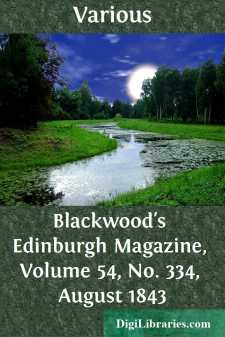Categories
- Antiques & Collectibles 13
- Architecture 36
- Art 48
- Bibles 22
- Biography & Autobiography 813
- Body, Mind & Spirit 142
- Business & Economics 28
- Children's Books 17
- Children's Fiction 14
- Computers 4
- Cooking 94
- Crafts & Hobbies 4
- Drama 346
- Education 46
- Family & Relationships 57
- Fiction 11829
- Games 19
- Gardening 17
- Health & Fitness 34
- History 1377
- House & Home 1
- Humor 147
- Juvenile Fiction 1873
- Juvenile Nonfiction 202
- Language Arts & Disciplines 88
- Law 16
- Literary Collections 686
- Literary Criticism 179
- Mathematics 13
- Medical 41
- Music 40
- Nature 179
- Non-Classifiable 1768
- Performing Arts 7
- Periodicals 1453
- Philosophy 64
- Photography 2
- Poetry 896
- Political Science 203
- Psychology 42
- Reference 154
- Religion 513
- Science 126
- Self-Help 84
- Social Science 81
- Sports & Recreation 34
- Study Aids 3
- Technology & Engineering 59
- Transportation 23
- Travel 463
- True Crime 29
Blackwood's Edinburgh Magazine, Volume 54, No. 334, August 1843
by: Various
Description:
Excerpt
PART THE LAST.
We here close our attempts to convey to the English reader some notion, however inadequate, of the genius and mind of Schiller. It is in these Poems, rather, perhaps, than in his Dramas and Prose works, that the upright earnestness of the mind, and the rich variety of the genius, are best displayed. Here, certainly, can best be seen that peculiar union of intellect and imagination which Mr Carlyle has so well distinguished as Schiller's characteristic attribute, and in which it would be difficult to name the modern poet by whom he is surpassed; and here the variety of the genius is least restrained and limited by the earnestness of the mind. For Schiller's variety is not that of Shakspeare, a creative and universal spirit, passing with the breath of life into characters the most diverse, and unidentified with the creations its invisible agency invokes. But it is the variety of one in whom the consciousness of his own existence is never laid aside; shown not so much in baring the minds and hearts of others, as in developing the progress and the struggles of his own, in the infinite gradations of joy and of sorrow, of exquisite feeling and solemn thought. Hence, in the drama, arise his faults and deficiencies; in his characters, he himself speaks. They are gigantic images of his own moods at different epochs of his life—impassioned with Moor—philosophizing with Posa—stately, tranquil, and sad, with Wallenstein. But as, in his dramas, this intense perception of self—this earnest, haunting consciousness—this feeling of genius as a burden, and of life as a religion—interferes with true dramatic versatility; so, on the contrary, these qualities give variety in his poems to the expositions of a mind always varying, always growing—always eager to think, and sensitive to feel. And his art loved to luxuriate in all that copious fertility of materials which the industry of a scholar submitted to the mastery of a poet; to turn to divine song whatever had charmed the study or aroused the thought: philosophy, history, the dogma, or the legend, all repose in the memory to bloom in the verse. The surface of knowledge apparent in his poems is immense; and this alone suffices to secure variety in thought. But the aspiring and ardent nature of his intellect made him love to attempt also constant experiments in the theme and in the style. The romantic ballad, the classical tale, the lyric, the didactic, the epigrammatic—the wealth of his music comprehended every note, the boldness of his temper adventured every hazard. Yet still, (as in our Byron, in our Goldsmith, and as, perhaps, in every mind tenacious of its impressions,) some favourite ideas take possession of him so forcibly, as to be frequently repeated as important truths. The sacred and majestic office of the poet—the beauty of ideal life, (in which the author of the "Robbers" and "William Tell" deemed, at last, that the only liberty was to be found)—the worship of Virtue and the Beautiful, for their own sake, and without hope of reward;—these, and many ideas minor to, and proceeding from them, revisit us in a thousand tones of eloquent and haunting music....












